
Automotive Manufacturing and COVID-19
This time last year, automotive plants in Canada were making full use of their production lines to produce their new vehicles.
May 27, 2020 | By Mario Cywinski
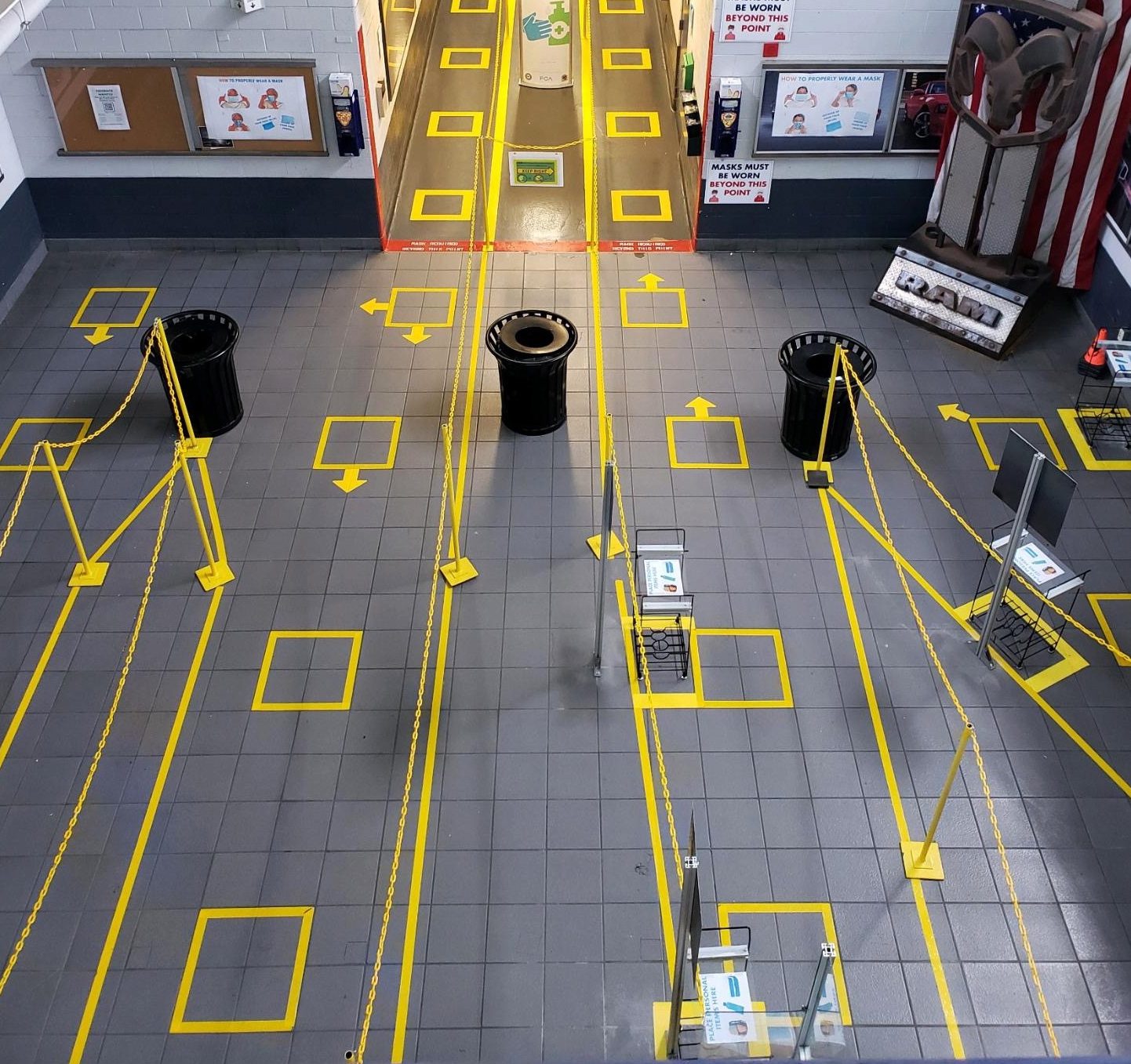
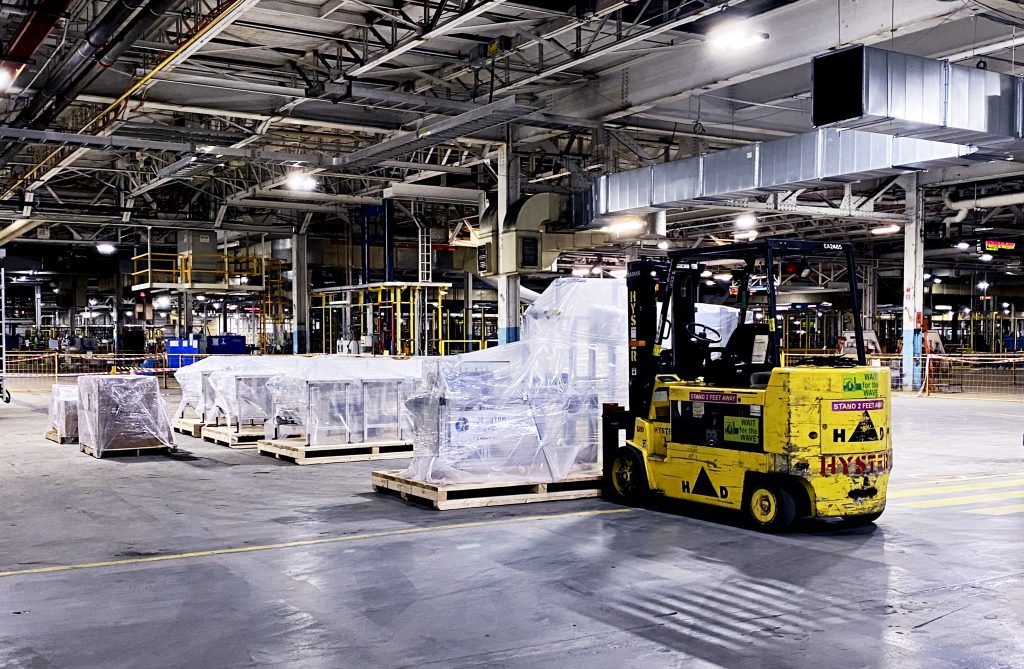
Photo credit: Toyota Canada.
Toyota Motor Manufacturing Canada (TMMC) had just announced that the Lexus NX would-be built in Ontario starting in 2022, and Honda of Canada Mfg (HCM) was on its way to producing its nine-millionth vehicle at its manufacturing facility in Ontario, which they hit early in 2020. Meanwhile, Ford Motor Company of Canada, FCA Canada Inc., and General Motors of Canada Company, were all still producing vehicles in Canada.
Flash forward to Spring 2020, and many automotive plants in Canada are only now reopening as they have been shuttered since March as a result of the COVID-19 pandemic. Instead of simply sitting idle, many have taken to adapting their operations and helping in the fight against the virus.
MRO reached out to OEMs who have plants in Canada to get a sense of what they are doing during these unique times. Trying to focus on the positives, here is a cross section of what each is doing.
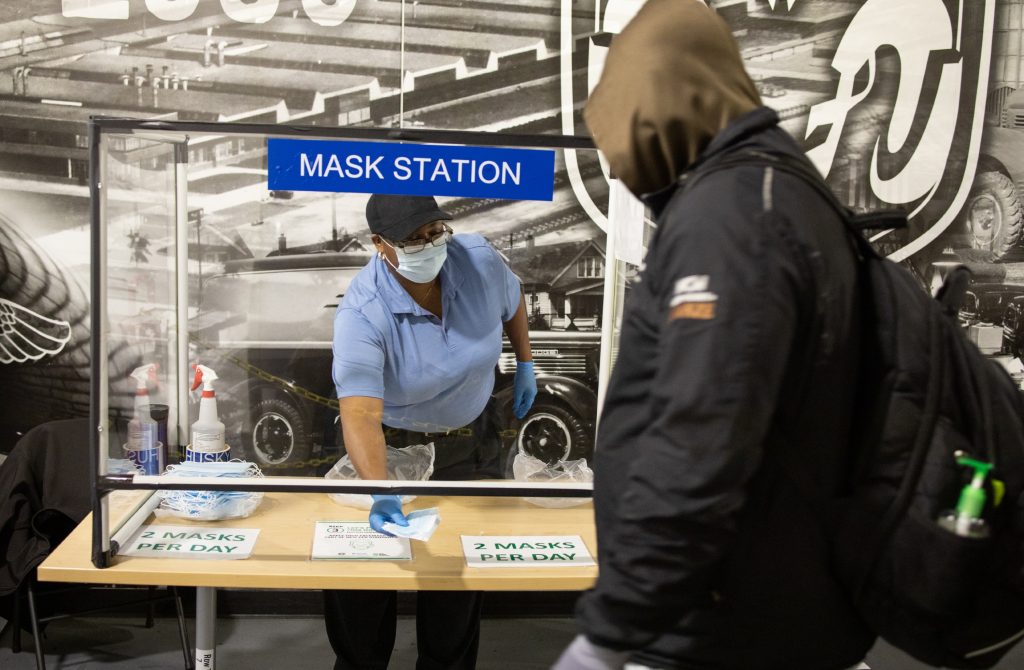
Photo credit: FCA Canada.
FCA Canada
FCA Canada has partnered with United Way/Centraide Windsor-Essex County by donating $100,000 to the agency’s COVID-19 Emergency Response Fund, which helps to provide food service programs for children in need.
At the production level, FCA has developed a program of safety measures to protect employees, their families, and surrounding communities from COVID-19, upon reopening (after closing in March).
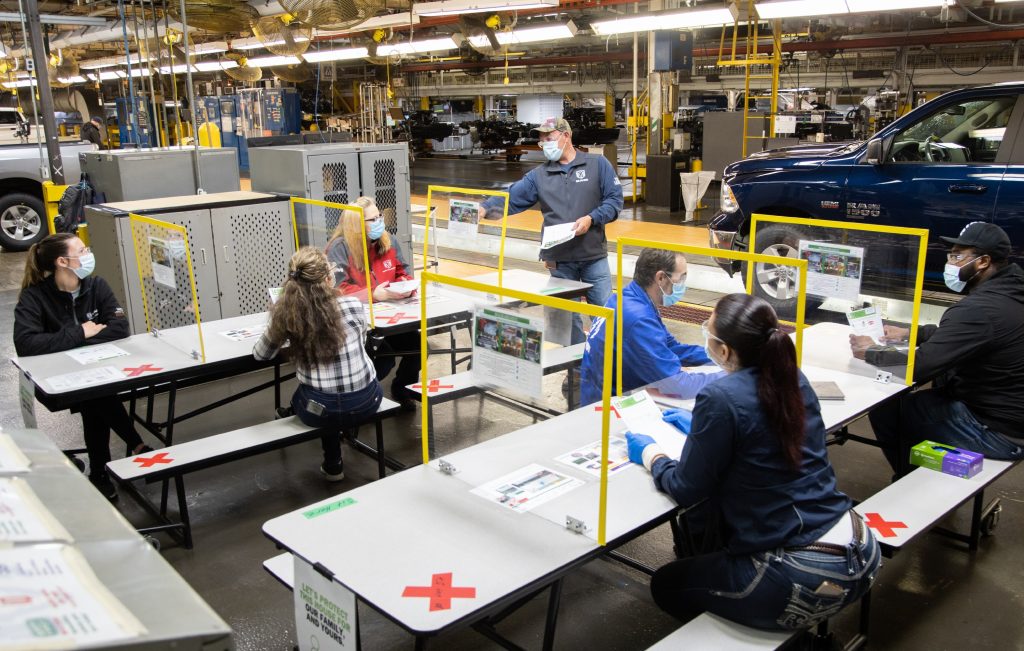
Photo credit: FCA Canada.
FCA will require its employees and all visitors, to complete a daily health risk assessment, consisting of: taking temperature under two hours before reporting to work or visiting the site, and completing a self-screening questionnaire and turning it in upon entry. FCA is also installing thermal imaging cameras, and requiring employees to wear provided masks and safety glasses at all times within the facility. Gloves and glasses will be required for applying and cleaning with disinfectant spray.
Visitors and contractors to any FCA facility will now be required to provide their own personal protection equipment for entry. Since it suspended production, FCA cleaned and disinfected over 57 million square feet of manufacturing floor space, developed enhanced cleaning and disinfecting schedules for common and high traffic areas, provided cleaning supplies at all workstations, installed over 2,000 hand sanitizer stations across all facilities, and created daily audits to be conducted to ensure new standards are followed.
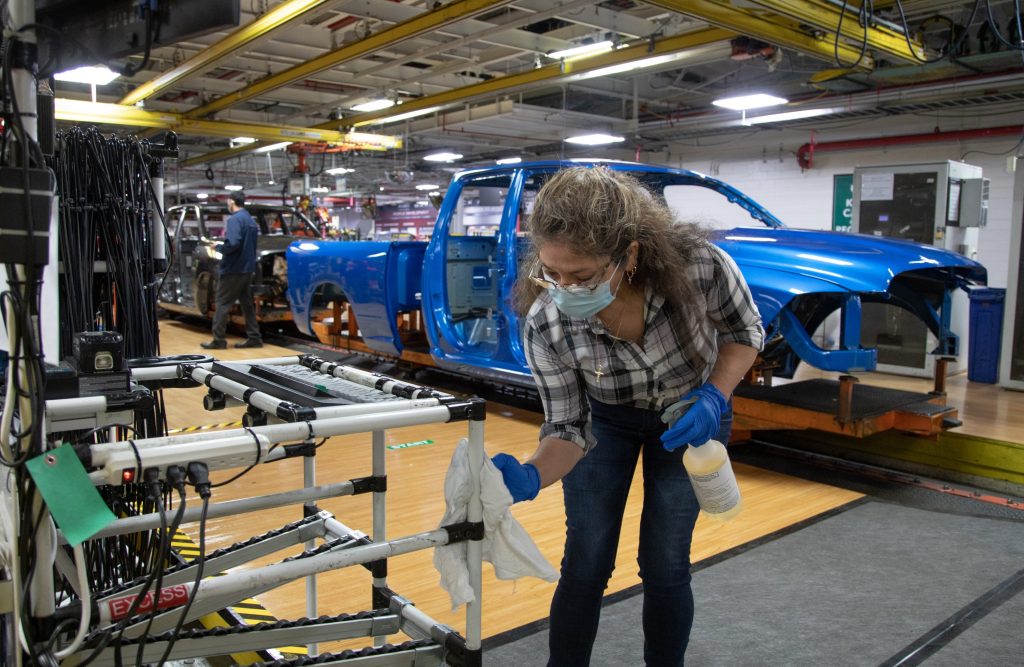
Photo credit: FCA Canada.
New social distancing practices have been implemented. Including over 17,000 workstations analyzed for adherence to six-foot social distancing guidelines, over 4,700 job areas and workstations redesigned or protective barriers installed, installed plexiglass partitions and created visual management guides for social distancing throughout all buildings, staggered start times and added time to breaks and lunch, suspended meetings of over eight employees at a time and transitioned to virtual meetings, wherever possible, and added new approval protocols for facility visitors.
When production restarts, FCA will increase the number of times per shift high-traffic, high-use areas, and common touch points, are cleaned and disinfected, 10 minutes per shift will be dedicated to cleaning and disinfecting employee workstations.
FCA also plans to manufacture and donate protective face masks. Producing over one million per month, with initial distribution to Canada, the United States, and Mexico.
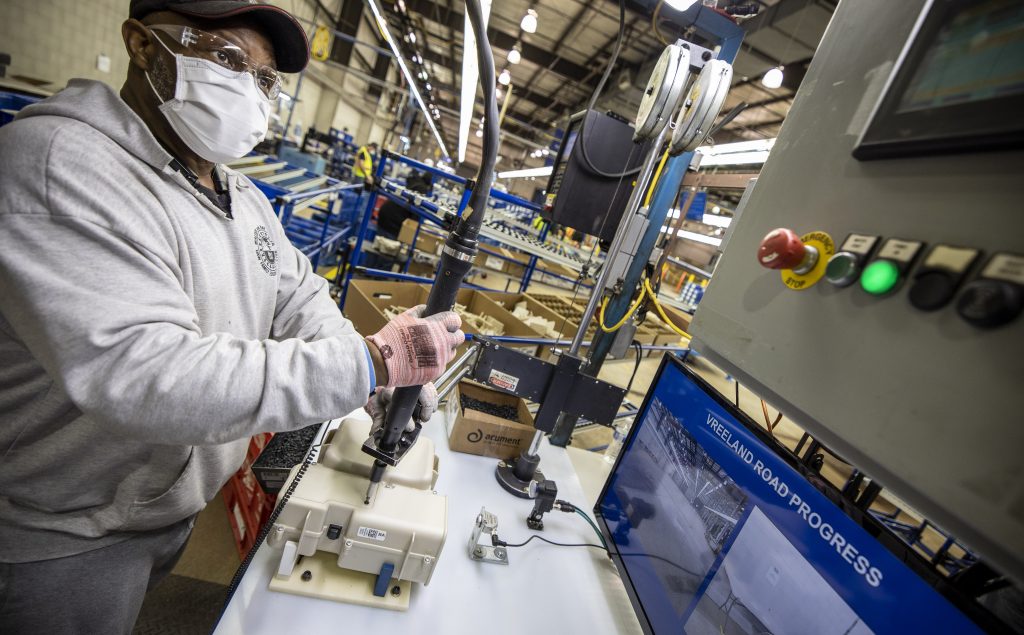
Photo credit: Ford Motor Company.
Ford Motor Company of Canada
Ford of Canada began production of face shields at its Windsor site operations. It is working with the Ontario and federal governments to distribute the face shields across Canada. Ford plans to assemble over 2.75 million face shields to help medical personal and first responders. Ford of Canada has also donated 2,900 pairs of nitrile gloves to the Brampton Civic Hospital, and 80 N95 masks to the Oakville Trafalgar Memorial Hospital.
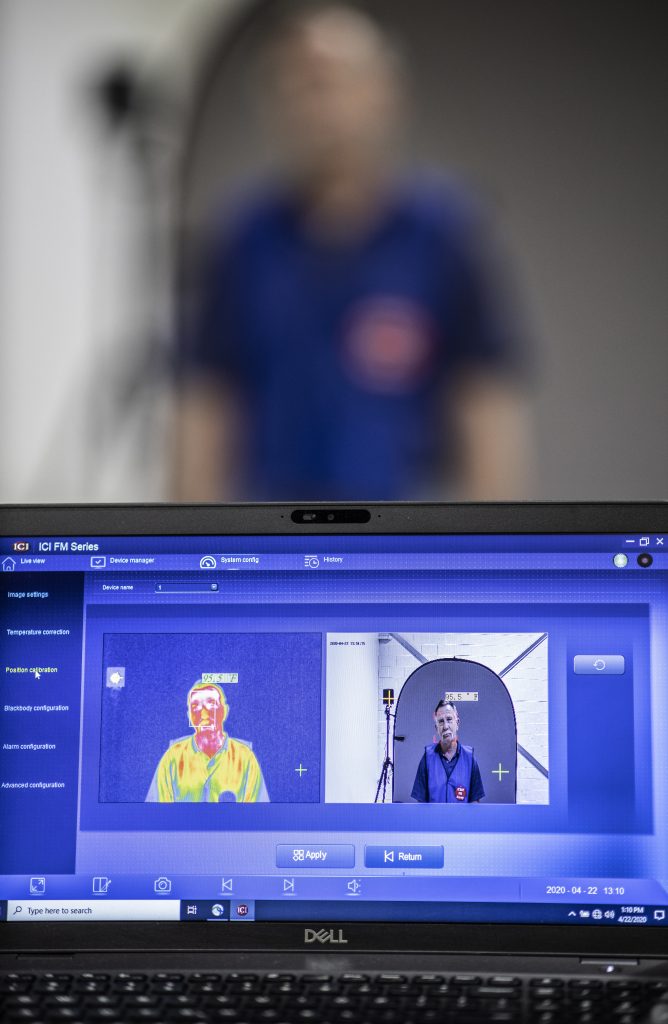
Photo credit: Ford Motor Company.
For production facilities, Ford has created health and safety protocols, that include daily online health self-certifications completed before work every day; employees or visitors who are symptomatic or have been exposed to the virus, are told not to come to work; no-touch temperature scans upon arrival, anyone with a raised temperature is not permitted to enter, is instructed to consult with a medical practitioner, and needs to be cleared before returning to work.
Face masks are required for everyone entering a Ford facility. Ford team members will be provided a care kit (face mask and other items). Safety glasses with side shields or face shields as added requirements for jobs that don’t allow for social distancing.
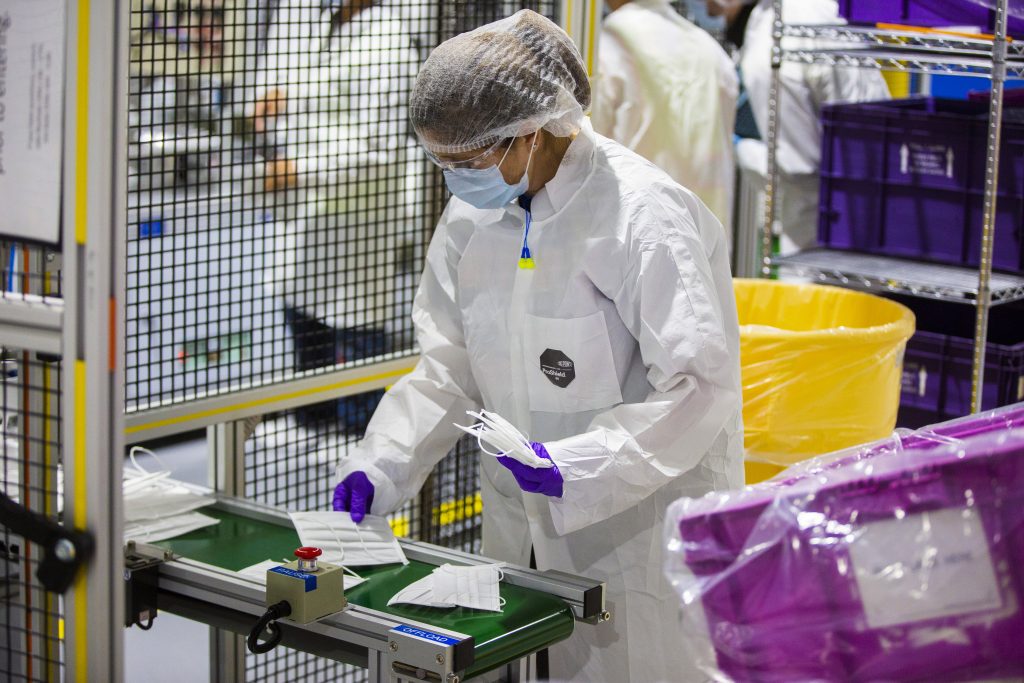
Photo credit: Ford Motor Company.
Ford is evaluating workstations and work patterns. Facilities that have been cleaned and disinfected will be cleaned with increased frequency upon reopening. Hand sanitation stations have been added at Ford facilities and signs for proper hand washing methods have been placed in all restrooms.
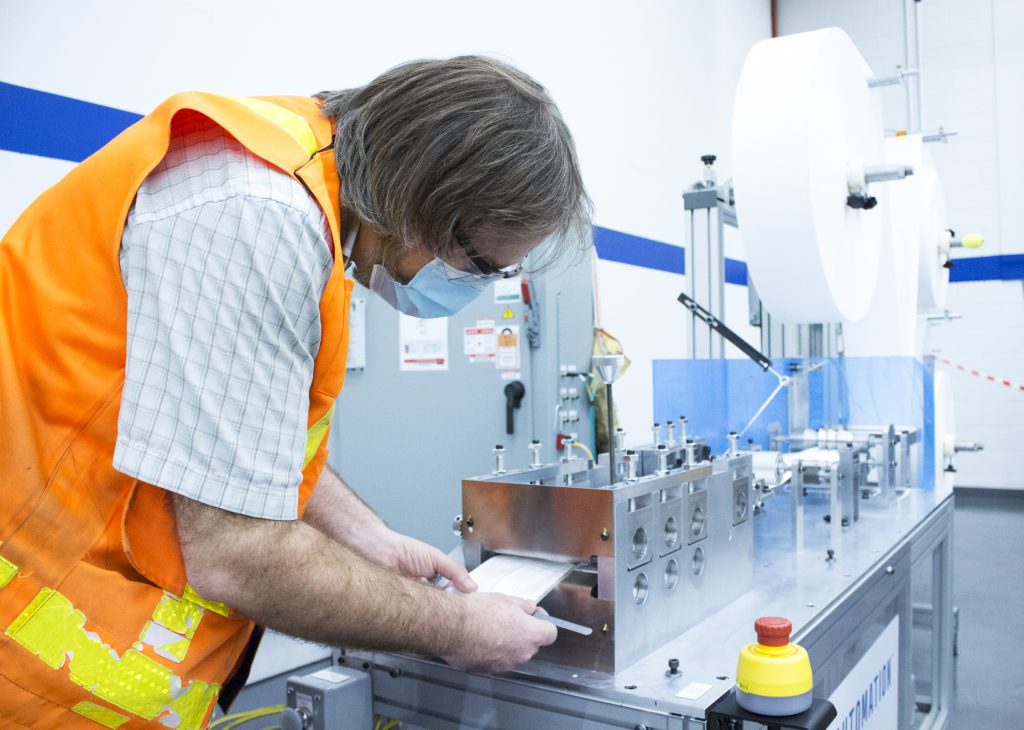
Photo credit: General Motors Canada.
General Motors of Canada
General Motors Canada is preparing parts of its Oshawa plant to produce face masks to help meet the country’s need for face masks. The model will be based on the GM production model in place in Warren, Michigan. Experts from Warren mask production line were onsite in Oshawa in May to share knowledge.
GM plans to manufacture approximately one million masks per month at cost for The Government of Canada with around 50 employees supporting two shifts of production. In all, GM will make 10 million face masks for the Government over the next year.
GM has built and prepared a clean room environment with enhanced safety protocols, delivered and installed the required machinery, and started training for the start of production. Equipment for the mask line arrived in Oshawa in April, and a portion of the plant has been converted into an official Canadian Mask Making (CMM) room.
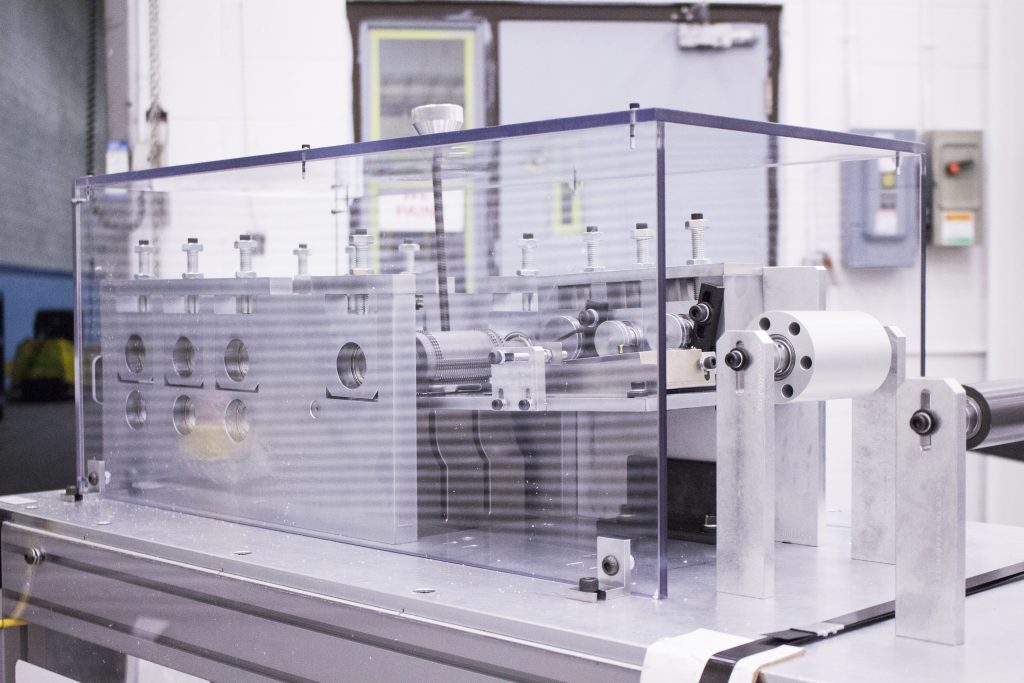
Photo: General Motors Canada.
GM Canada is also collecting and donating PPE from its Canadian partners to help the Public Health Agency of Canada meet the needs of healthcare workers. The donated PPE are being collected at Woodstock Parts Distribution Centre and Oshawa OEM Stamped Products and Services operation.
Collected items include N95 face masks, safety glasses, sanitized goggles, isolation gowns and coveralls, hand sanitizers, and gloves (latex, nitrile, and vinyl, in all sizes). All collected items are clean and in their original packaging.
General Motors, Ventec Life Systems, and StopTheSpread. org, are collaborating, in an effort to allow Ventec to increase production of its respiratory care products during the COVID-19 pandemic. Ventec will use logistics, purchasing and manufacturing expertise provided by GM, to build more ventilators.
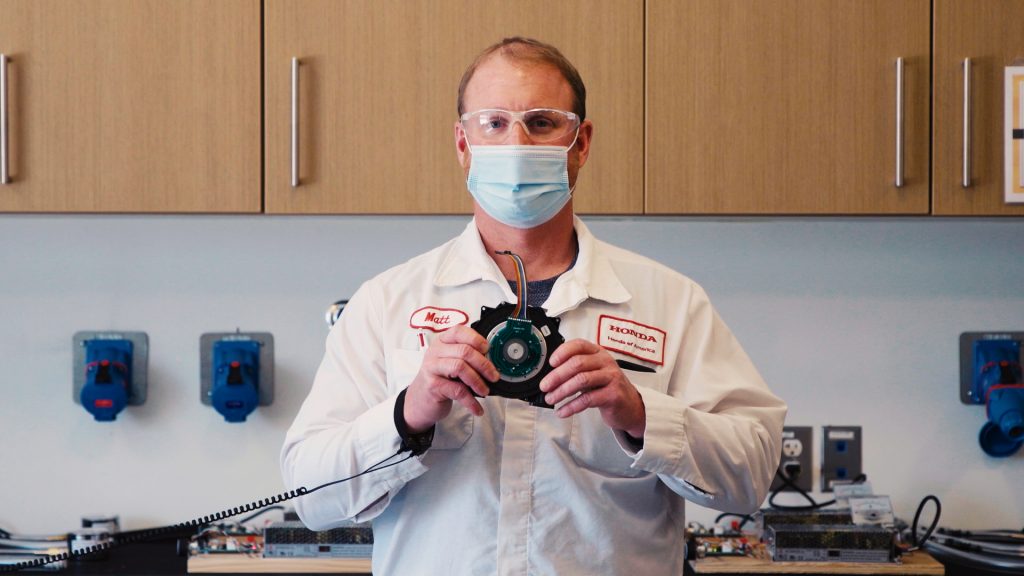
Photo credit: Honda Canada.
Honda Canada
Honda has put in place new health and safety procedures upon re-opening of their North American production plants. Measures and policies vary by location and company. Honda’s main focus is on the health and safety of its associates. This includes temperature scanning of all Honda associates, suppliers, contractors and visitors; those with a temperature of 100 F or higher will not be allowed to enter. Use of masks or cloth face coverings is now required at all times in all buildings (plants and offices will provide one new mask per day for every associate). Associates will be required to wear face shields in certain areas of the manufacturing plants.
Honda has increased cleaning, disinfecting and sanitizing activities throughout its operations, and cleaning supplies will be provided for common areas. Social distancing measures are also being added that will staggered shift start times, and lunch and break times (seating arrangements have been changed, and more rooms added). Common areas (restrooms and locker rooms) will have capacity limits.
Each plant is adjusting its processes and workstations to be able to achieve social distancing on the production line where possible.
Honda Canada and HCM have donated over 45,000 PPE items to local Ontario hospitals. Honda associates at different Honda facilities (including HCM) are using 3D printers to manufacture parts for face shields to be donated.
The Honda Canada Foundation donated $500,000 to support essential nutrition and healthcare needs in Canada. This included $100,000 to each of: Food Banks Canada, Southlake Regional Health Centre in Newmarket, Stevenson Memorial Hospital Foundation in Alliston, Royal Victoria Regional Health Centre in Barrie, and Markham Stouffville Hospital in Markham. Honda pledged $1 million to address the needs of communities across North America, providing the vulnerable with access to food.
Honda also has the COVID-19 Special Matching Gift Program, associates make monetary donations to local food programs, with Honda matching up to $1,000 for each associate. So far, over 130 associates have donated over $19,500 to Food Banks Canada.
Honda has partnered with Dynaflo Inc. to increase their production of diaphragm compressors, a component used in portable ventilators. Honda aims to produce 10,000 compressors per month once production has reached capacity and maintain production to end of August. Further, Honda is investigating the ability to meet manufacturing needs for medical equipment by partnering with other companies.
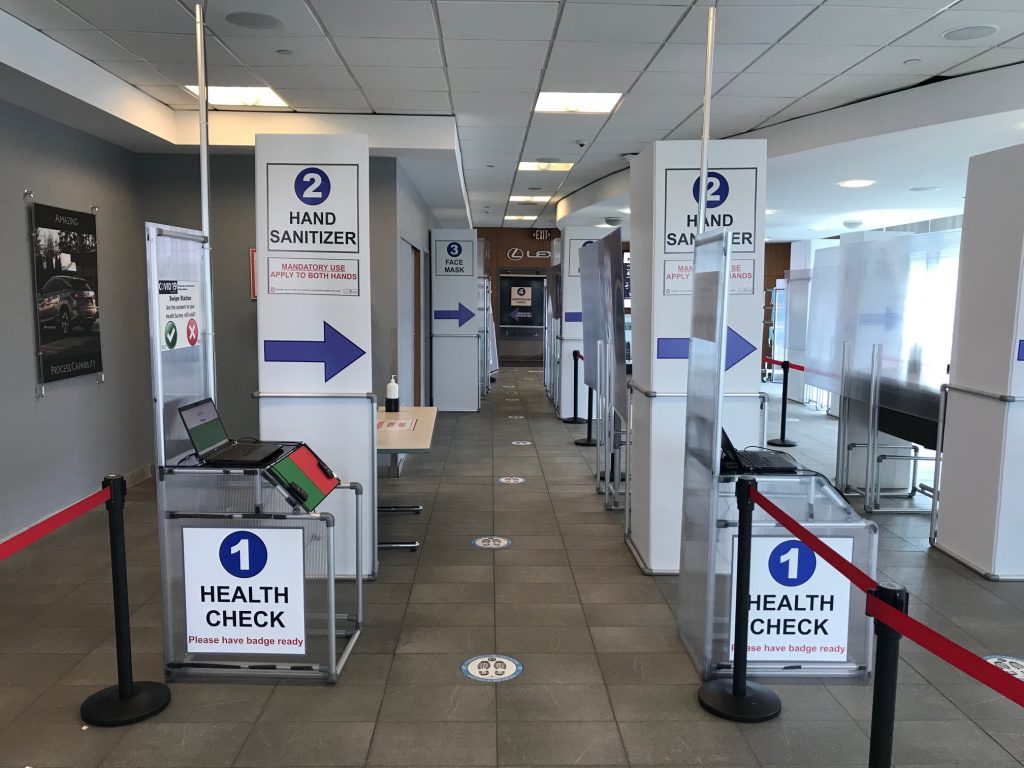
Photo credit: Toyota Canada.
Toyota Canada
Engineers from TMMC and Fanshawe College finished in the top nine in the Code Life Ventilator Challenge. The competition had teams design a low-cost, easy-to-use medical ventilator to help patients affected by COVID-19. The competition incorporated common parts that usually go in Toyota and Lexus vehicles (sensors and molded bearings) with components manufactured using in-house 3D printers. The team beat out over 1,000 entries from 94 countries.
Toyota Canada is using a phased approach to resuming operations, this allows employees to return to a work environment which implemented policies and procedures to ensure health and safety. Adjustments to operations include a health survey for anyone coming on site, controlled and appropriately spaced entryways into facilities, increased use and availability of PPE (face masks, face shields, gloves and hand sanitizer). Face masks provided to all employees.
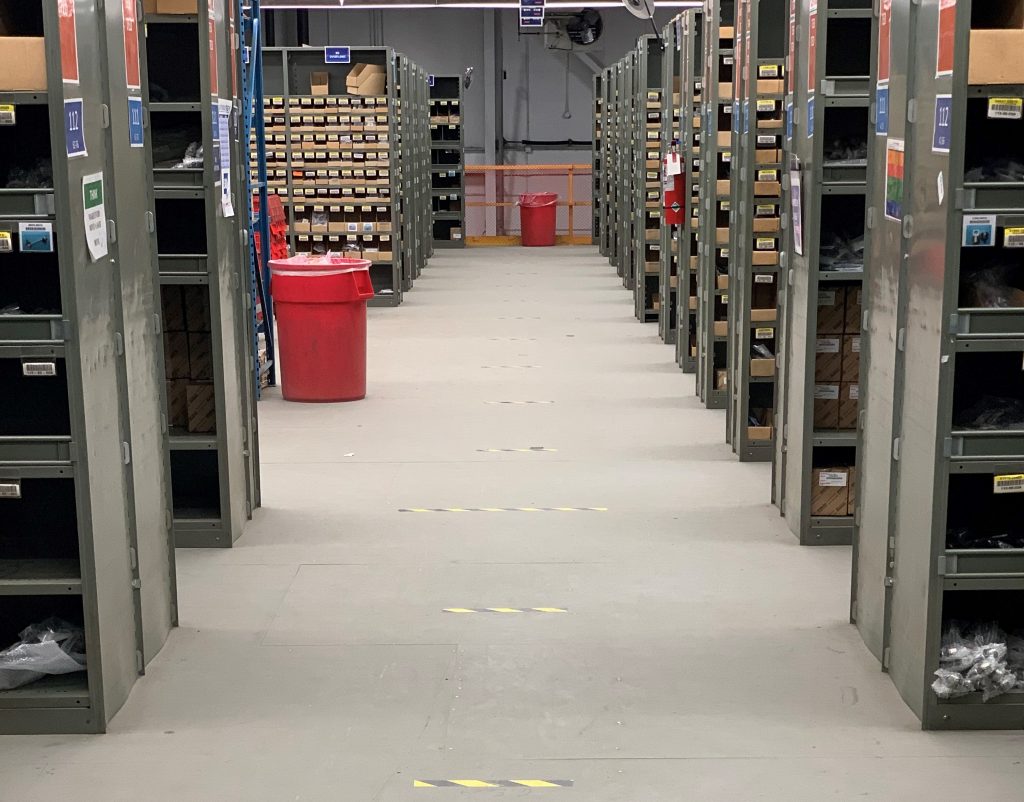
Photo credit: Toyota Canada.
Also, taking the temperature of anyone coming on site, each time they return, practicing physical distancing on the job, during all breaks and during shift changes, and frequent sanitizing of high-traffic areas, including break areas and restrooms.
TMMC has donated approximately 1,000 N95 masks and 1,000 surgical masks, and gloves, protective eyewear, and sanitary boot protectors, to local hospitals and long-term care facilities in Southwestern Ontario. TMMC is also working with Inksmith, a 3D printing company, to fabricate protective face masks using six 3D printers at its production facilities.
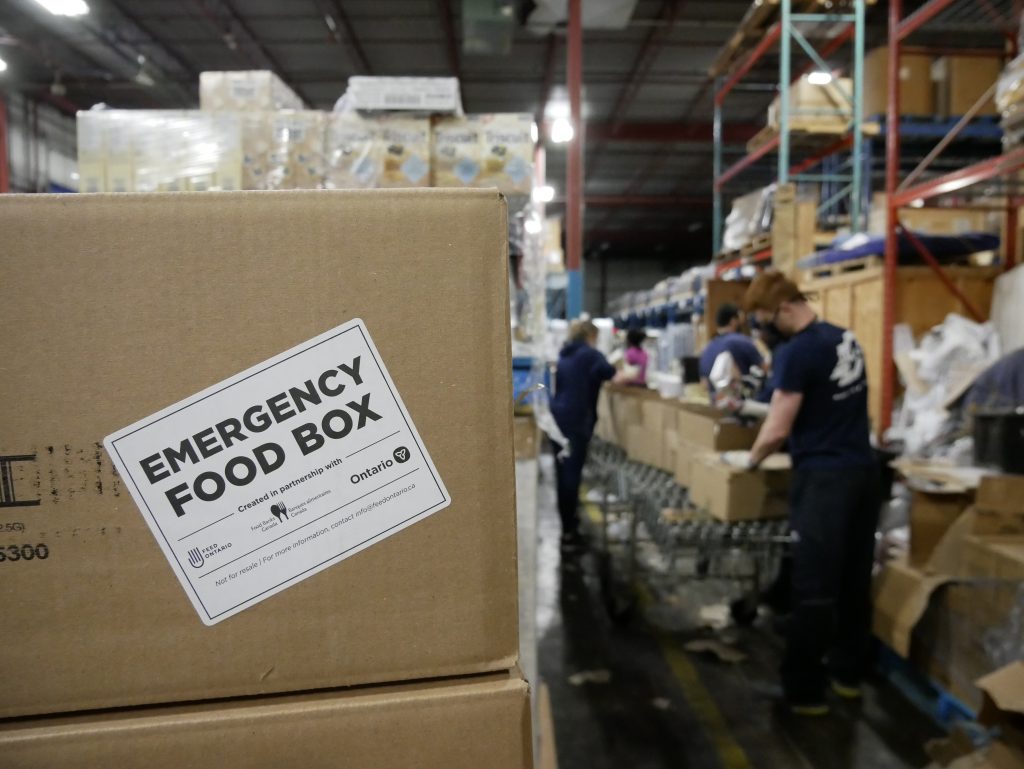
Photo credit: Toyota Canada.
Toyota expanded its partnership with Canadian Blood Services and donated over $1 million worth of advertising to communicate the need for donations of blood and blood products.
Toyota Canada is matching donations its dealers make to local COVID-19 response initiatives, up to a total of $1 million. Many Toyota dealers across Canada are focusing on food security, donating to local food banks and other community food programs, Toyota Canada is matching their donations.
Other Companies
It is great to see that companies which have had to shut down their day-to-day plant operations, pivoting to help with the pandemic. Many other automotive companies, suppliers, and production plants are also working on helping with the COVID-19 pandemic. However, as June is MRO’s production plants issue, the focus is on the five companies that build vehicles and/or parts in Canada. MRO
